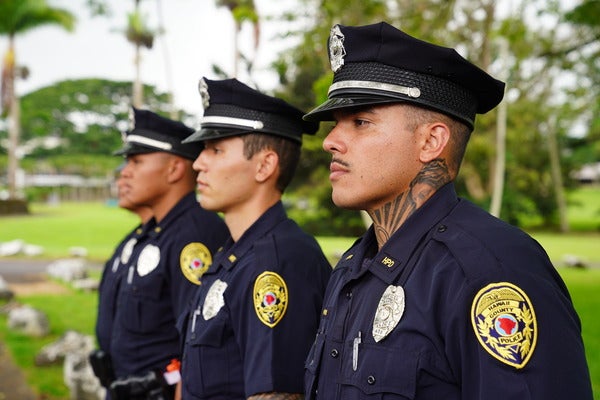Policies
Accreditation

The Hawaiʻi Police Department is accredited by the Commission on Accreditation for Law Enforcement Agencies, Inc., (CALEA).
The department was awarded its initial accreditation at the CALEA fall conference on November 17, 2012, in Jacksonville, Florida.
The department received re-accreditation on November 21, 2015, in Miami, Florida; November 16, 2019, in Covington, Kentucky; and its latest re-accreditation on November 11, 2023, in Bellevue, Washington.
Of the roughly 18,000 law enforcement agencies in the United States, only about 793 are CALEA accredited.
To earn accreditation, the police department had to demonstrate that it is in compliance with more than 400 applicable CALEA standards. To remain accredited, the department must maintain compliance with those standards and undergo a new CALEA assessment every four years.
CALEA was established as a credentialing authority in 1979 through the joint efforts of major law enforcement executive associations such as the International Association of Chiefs of Police (IACP), the National Organization of Black Law Enforcement Executives (NOBLE), National Sheriff’s Association (NSA), and the Police Executive Research Forum (PERF). The goals of CALEA are to improve the delivery of public safety services by developing and maintaining a body of standards, establishing and administering an accreditation process for law enforcement agencies, and recognizing professional excellence in public safety.
Public Feedback Sought for CALEA Law Enforcement Accreditation Process
The Hawaiʻi Police Department is participating in the CALEA Law Enforcement Accreditation process. As a part of this process, we provide an opportunity for public feedback via the CALEA portal.
The purpose of this public portal is to receive comments regarding engagement in the service community, delivery of public safety services, overall candidacy for accredited status, and compliance to CALEA standards. These comments can be in the form of commendations or concerns. The overall intent of the accreditation process is to provide our agency with information to support continuous improvement, as well as foster our pursuit of professional excellence.
It is important to know that CALEA is not an investigatory body and subsequently the public portal should not be used to submit information for such purposes. Additionally, there will be no response other than acknowledgement to submissions; however, the information will be considered in context to its relevancy to compliance with standards and the tenets of CALEA® Accreditation.
Code of Ethics

AS A LAW ENFORCEMENT OFFICER, my fundamental duty is to serve mankind; to safeguard lives and property; to protect the innocent against deception, the weak against oppression or intimidation, and the peaceful against violence or disorder; and to respect the Constitutional rights of all men to liberty, equality and justice.
I WILL keep my private life unsullied as an example to all; maintain courageous calm in the face of danger, scorn, or ridicule; develop self-restraint; and be constantly mindful of the welfare of others. Honest in thought and deed in both my personal and official life, I will be exemplary in obeying the laws of the land and the regulations of my department. Whatever I see or hear of a confidential nature or that is confided to me in my official capacity will be kept ever secret unless revelation is necessary in the performance of my duty.
I WILL never act officiously or permit personal feelings, prejudices, animosities or friendships to influence my decisions. With no compromise for crime and with relentless prosecution of criminals, I will enforce the law courteously and appropriately without fear or favor, malice or ill will, never employing unnecessary force or violence and never accepting gratuities.
I RECOGNIZE the badge of my office as a symbol of public faith, and I accept it as a public trust to be held so long as I am true to the ethics of the police service. I will constantly strive to achieve these objectives and ideals, dedicating myself to my chosen profession… law enforcement.
Standards of Conduct
Hawaiʻi Police Department has defined and established Standards of Conduct for all sworn and civilian employees of the department. These Standards of Conduct, which can be found in General Order 300, detail the professional conduct and responsibilities of all employees, ranging from knowledge of laws to conduct towards the public.
Sworn officers and civilian employees shall be subject to all Standards of Conduct and all directives, orders, and procedures of the Hawaiʻi Police Department at all times, whether on or off duty, including all periods of absence.
About General Orders
General Orders are issued for the purpose of establishing or revising Hawaiʻi Police Department policy, rules, and practices that govern the police department in its internal and external affairs. There are a total of 105 General Orders in place, each with multiple subsections, detailing everything from body worn camera usage and uniform regulations to arrest policies and maternity leave.
Issued at the department level by the Police Chief or designee, General Orders establish a clear guide to acceptable standards of conduct and professional integrity while also providing a basis for the orderly and disciplined performance of duty.
Having detailed, clearly written directives promotes a surer knowledge of what is expected of all members, ranks, and assignments, resulting in a greater degree of self-assurance in all positions. As circumstances permit, temporary deviations or adjustments from the General Orders may be authorized to meet unusual or unique situations.
General Orders
GO 101 – Official Channels and Correspondence
GO 103 – Telephone Number and Address Required
GO 200 – Administration and Organization
GO 203 – Line and Staff Inspections
GO 204 – District and Beat Boundaries
GO 301 – General Rules for Commanding and Superior Officers
GO 303 – Procedures for Administrative Review Board
GO 304 – Special Review Board (Deadly Force Incidents)
GO 305 – Sworn Member Involved Domestic Violence
GO 400 – Training of Personnel
GO 403 – Intra-Department Transfers and Other Personnel Movements
GO 404 – Retirements and Resignations
GO 406 – Workers’ Compensation
GO 407 – Overtime Work & Compensatory Time
GO 408 – Employees’ Retirement
GO 410 – Special Police Officers
GO 411 – Reserve Police Officer
GO 413 – Special Off-Duty Employment
GO 414 – Retirement Badges – Issue and Recall
GO 415 – Reporting-In Times and Meal Schedules
GO 416 – Working Schedule & Attendance Record
GO 417 – Assignment, Supervision, and Direction of Officers
GO 418 – Police Recruit Training
GO 420 – Identification Cards, Personnel Photographs, Visitor Passes
GO 421 – Police Officer III Temporary Reallocation Program
GO 422 – Volunteer Disabled Parking Enforcement Program
GO 423 – Equal Opportunity Employment Policy
GO 500 – Customs and Courtesies of the Service
GO 504 – Family and Medical Leave
GO 505 – Illness or Other Disability While Off Duty
GO 506 – Injury in the Line of Duty
GO 507 – Leave of Absence Without Pay
GO 508 – Military Service Leave
GO 509 – Death or Serious Injury of Member
GO 511 – Personal Appearance B
GO 512 – Use of Intoxicants and Drugs
GO 513 – Traffic Casualties Involving Members, County Owned and Subsidized Vehicles
GO 514 – Court Appearance Requirements
GO 515 – Travel and Other Expenses
GO 516 – Long Distance Telephone Calls
GO 517 – Recesses for Employees
GO 518 – Political Activities and Voting
GO 524 – Temporary Limited Duty
GO 525 – Accidental Injury Leave
GO 527 – Investigative Review Committee
GO 528 – Transporting of Detainees
GO 531 – Psychological Evaluations
GO 533 – Peer Counseling & Critical Incident Support Units
GO 534 – Tuition Reimbursement Program
GO 600 – Duty to Report All Offenses
GO 601 – Firearms and Transportation of Prisoners Aboard Aircraft
GO 602 – Motor Vehicle Pursuits
GO 603 – Strip and Body Cavity Searches
GO 607 – Exculpatory Evidence Disclosure Requirements
GO 701 – Police – News Media Relations
GO 703 – Restricting Release of Police Information
GO 704 – Public Speaking Engagements
GO 707 – Release of Information, Family Contacts and Public Relations in Homicide Investigations
GO 709 – Critical Incident Public Information Plan
GO 800 – Uniform Regulation and Approved Attire
GO 802 – Police Vehicles and Equipment
GO 803 – Gasoline, Oil, and Mileage Record
GO 804 – Use of Force
GO 806 – Radio Communication Procedures
GO 807 – Emergency Vehicle Operation
GO 808 – Transporting Persons in Patrol Cars
GO 809 – Use of Temporary Vehicles for Official Police Duty
GO 813 – Emergency Major Incident Responses
GO 814 – Police Subsidized Vehicle Extension Request Procedures
GO 816 – Use of Less Lethal Extended Range Impact Devices
Unsolved Homicides
Hawaiʻi Police Department believes every victim deserves justice, and that the deceased victim’s family, friends, and community deserve closure.
Please take a moment to review the Unsolved Homicides summaries and if you have any information pertaining to any of these cases, please submit a tip, email us or call our Unsolved Homicides Division at (808) 961-2380 or Crime Stoppers at (808) 961-8300. Thank you for your help!

